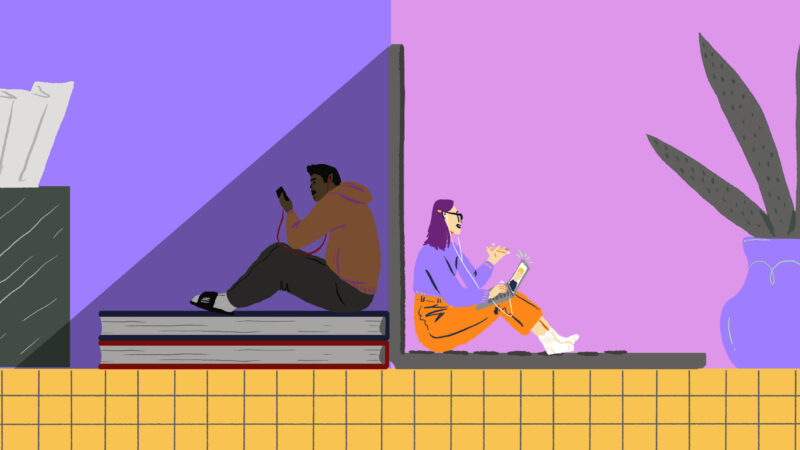1 in 5 high schoolers has had a romantic AI relationship, or knows someone who has
New survey data finds that nearly 1 in 5 high schoolers say they or someone they know has had a romantic relationship with artificial intelligence. And 42% of students surveyed say they or someone they know have used AI for companionship.
That’s according to new research from the Center for Democracy and Technology (CDT), a nonprofit that advocates for civil rights, civil liberties and responsible use of data and technology.
CDT conducted national surveys of roughly 800 sixth through 12th grade public school teachers, 1,000 ninth through 12th grade students and 1,000 parents. The vast majority — 86% of students, 85% of educators and 75% of parents — say they used AI during the last school year.
CDT’s Elizabeth Laird, one of the authors of the report, says the surveys showed some strong correlations.
Among them: “The more ways that a student reports that their school uses AI, the more likely they are to report things like ‘I know someone who considers AI to be a friend,’ ‘I know someone who considers AI to be a romantic partner.'”
Data breaches, deepfakes and damaged trust
Laird says the surveys found higher levels of AI use in schools — defined as seven to 10 school-related uses for teachers, and four to six for students — correlates with increased exposure to data breaches, troubling interactions between students and AI and AI-generated deepfakes, or manipulated videos or photos that can be used to sexually harass and bully students.
“This technology is a new vector for sexual harassment and bullying, which were long-standing issues [before widespread use of AI],” Laird says, “and this has become a new way to exacerbate that.”
According to the report, 28% of teachers who use AI for many school-related tasks say their school experienced a large-scale data breach, compared to 18% of teachers who don’t use AI or use it for only a few tasks.
Laird, who previously worked as a data privacy officer for D.C.’s state education agency, says she believes the more data schools share with AI systems, the more they risk a data breach.
“AI systems take a lot of data, they also spit out a lot of information too,” she says. “That is contributing to that connection.”
Teachers with higher levels of school-related AI use were also more likely to report that an AI system they were using in class failed to work as intended.
These teachers were also more likely to report that the use of AI damaged community trust in schools. For example, Laird says schools frequently use AI-powered software to monitor activity on school-issued devices, in some cases leading to false alarms and even student arrests. She says this is especially concerning for students who can’t afford their own personal computers.
“So if you are someone who has a personal device and doesn’t have to use a school-issued device, you can essentially afford to keep your documents and messages private,” Laird says.
Risks to student wellbeing
Students who attend schools that use AI a lot were also more likely to report that they or a friend had used AI for mental health support, as a companion, as a way to escape reality and to have a romantic relationship.
When students reported having conversations with AI systems for personal reasons, and not for school work, 31% said they used a device or software provided by their school.
“I think students should know that they are not actually talking to a person. They are talking to a tool, and those tools have known limitations,” Laird says. “Our research suggests that the AI literacy and the training that students are getting are very basic.”
Laird says students and educators often aren’t getting training or guidance to help them navigate the more complex challenges associated with the technology.
For example, only 11% of surveyed teachers said they received training on how to respond if they suspect a student’s use of AI is detrimental to their wellbeing.
Educators who frequently use AI were more likely to say the technology improves their teaching, saves them time and provides individualized learning for students – but students in schools where AI use is prevalent reported higher levels of concern about the technology, including that it makes them feel less connected to their teachers.
“What we hear from students is that while there may be value in this, there’s also some negative consequences that are coming with it, too,” Laird says. “And if we’re going to realize the benefits of AI, you know, we really need to pay attention to what students are telling us.”
Homeland Security suspends TSA PreCheck and Global Entry airport security programs
The U.S. Department of Homeland Security is suspending the TSA PreCheck and Global Entry airport security programs as a partial government shutdown continues.
FCC calls for more ‘patriotic, pro-America’ programming in runup to 250th anniversary
The "Pledge America Campaign" urges broadcasters to focus on programming that highlights "the historic accomplishments of this great nation from our founding through the Trump Administration today."
NASA’s Artemis II lunar mission may not launch in March after all
NASA says an "interrupted flow" of helium to the rocket system could require a rollback to the Vehicle Assembly Building. If it happens, NASA says the launch to the moon would be delayed until April.
Mississippi health system shuts down clinics statewide after ransomware attack
The attack was launched on Thursday and prompted hospital officials to close all of its 35 clinics across the state.
Blizzard conditions and high winds forecast for NYC, East coast
The winter storm is expected to bring blizzard conditions and possibly up to 2 feet of snow in New York City.
Norway’s Johannes Klæbo is new Winter Olympics king
Johannes Klaebo won all six cross-country skiing events at this year's Winter Olympics, the surpassing Eric Heiden's five golds in 1980.







